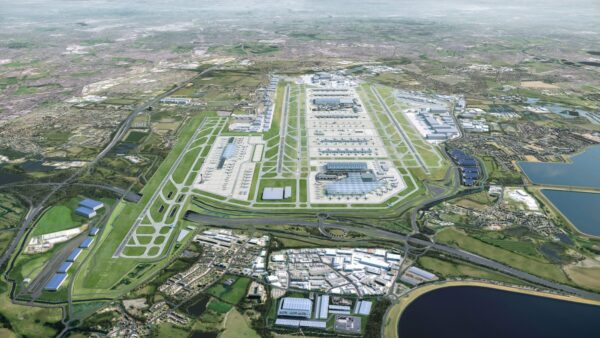
The well-connected Randstad and Rhine-Ruhr areas may be the government’s inspiration for the Northern Powerhouse, but the most popular reference point is in fact China, where high-speed rail links have shrunk travelling times between major cities, boosted productivity and contributed to rocketing growth figures.
The phrase itself has echoes of ambitious Chinese programmes — and coincides with China’s One Belt, One Road project to create connectivity and cooperation along the 21st century Silk Road.
The similarities are highlighted by Rhys Whalley, executive director of the Manchester China Forum, a business-led initiative set up in 2012 to increase Greater Manchester’s trade, investment and education links with China, and build on connections that go back to the nineteenth-century textiles trade.
Read related articles
Powering up for the Northern Powerhouse
China’s BCEG takes key Manchester role in wave of contract wins
“If you look to China to see how they’ve leveraged infrastructure development to drive economic growth, and create city cluster collaboration, there’s a huge opportunity there to look at best practice,” says Whalley. “China has developed the technology to deliver 12,000km of high-speed rail network that’s created a level of economic agglomeration and economic interdependency that wasn’t there previously. There’s a lot to be learned from what’s been done in China.”
The feeling of a connection between the Northern Powerhouse and China is mutual — and was underlined by Chinese president Xi Jinping’s visit to Manchester in October. Manchester has identified China as a key strategic market and partner, while the Powerhouse concept has captured the imagination of Chinese investors, at state, institutional and individual level.
“Manchester has gone out of its way to court the Chinese, with investment into Manchester Airport City, before anything was approved in London. And the city council has been twinned with the city of Wuhan for 25 years,” says Pinsent Masons’ partner Chris Hallam. “Manchester is quite an investable area – it’s the fastest growing region in the services sector and there’s a key infrastructure demand.”
Four major property developments in Manchester have already secured investment from China. Developer Scarborough Group has secured investment from China’s Hualing Group as well as Top Spring of Hong Kong and Singaporean Metro Holdings to its £700m Middlewood Locks mixed-use project, where Chinese contractor Beijing China Engineering Group (BCEG)is also in line to be main contractor.
Manchester City football club has attracted £265m investment from China Media Holdings, which will be used to develop its infrastructure assets, namely the Etihad Stadium.

David Cameron (right) and Xi Jinping (centre) visit Manchester Airport
In 2013, BCEG formed a joint venture with Carillion to invest in and build Manchester Airport City, the UK’s largest regeneration project since the London Olympics. Meanwhile, Manchester legends Gary Neville and Ryan Giggs’ £400m scheme to redevelop the Bootle Street police station has attracted investment from a Singaporean investor and BCEG.
One factor in the synergies between China’s business community and Manchester’s is the fact that Manchester’s universities have the largest population of students from China in the UK, according to Whalley.
At property company Select Property Group, director Giles Beswick attributes securing investment from a Malaysian pharmaceuticals company to the fact that its chief executive is a Manchester University alumnus. “I sold a substantial investment to a Malaysian telecoms entrepreneur. He said ‘I used to live in that building’ – it turns out he studied here as a student.”
Much of Select’s pipeline is in student apartments and studios, where Beswick says that 18% of total investment sales come from the Far East region.
“With the Chinese economy slowing down, attention is shifting to other parts of the world. That also filters down to the retail level, and the UK has historically been considered a safe place to invest in real estate,” he says.
“Manchester has gone out of its way to court the Chinese. It’s been twinned with Wuhan for 25 years.”
Chris Hallam, Pinsent Masons
And that flow of investment is likely to continue, says Beswick. “A lot of our pipeline projects will be funded by institutions which will be funded via the Far East. They have mandates to spend money on projects that will generate significant funds, they will end up owning a lot of assets across the Northern Powerhouse. There are significant levels of interest in what we’re doing from these types of institutional investors.”
Developer Scarborough Properties also exemplifies the bilateral links between China and the north west. It’s had existing relationships with Chinese and Singaporean investors for the past 14 years, just as it is an investor in Chinese sporting, retail and real estate projects. When the Middlewood Locks project arose, its partners in the Far East also had the cash and liquidity to move quickly.
“They were looking for opportunities in the UK so it shows what a strong investment opportunity proposition it was, that Manchester was the first deal,” says development director Lee Savage. Scarborough has also awarded main contractor status on the scheme to BCEG, with Savage saying the scheme will be “delivered traditionally using the UK supply chain, with international materials where relevant”.
Savage also adds: “Manchester is a global brand and recognisable virtually anywhere in the world. It’s commonly known it has a clear investment proposition, they’re open for business and they communicate with the private sector and investors in a way they understand.”
And that clear proposition, says the Manchester China Forum’s Rhys Whalley, will help to drive further investment and the Powerhouse itself. “The Chinese president’s visit has helped to confirm the growing importance of Manchester in the North, and has helped us inject a new level of energy in to the relationship.”











Manchester will always be popular with Chinese investors as everyone knows of Manchester United. Never underestimate the export potential derived through a world class football team, especially Man. U.